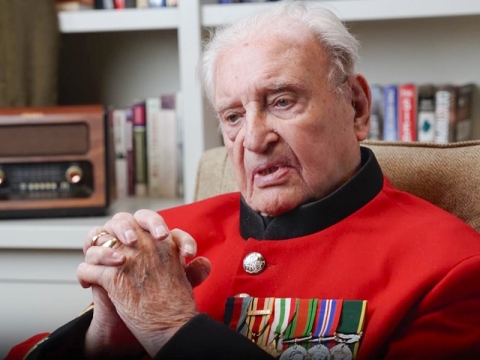News
John Morris, 103 years: “Europe cannot afford to forget about security”
John Morris, 103 years
In a heartfelt video published today by NATO, British veteran John Morris, the last surviving member of the elite Raid Support Regiment (RSR), shares his memories of World War II and delivers a powerful defense of NATO’s role in present-day Europe. At 103 years old, Morris not only revisits the past—he warns about today’s threats and offers a reflection that should resonate deeply with those currently debating Spain’s place in the Atlantic alliance.
Called up at just 17, Morris first served in the 89th Anti-Aircraft Regiment before being selected for the RSR, an elite unit tasked with supporting Special Forces using heavy weapons behind enemy lines. “When you’re in the Special Forces, you don’t really expect to come out alive,” he admits with a mix of humor and brutal honesty. He recalls his first jump from a Wellington bomber: “I think they pushed me—I wouldn’t have gone voluntarily, that’s for sure.”
Called up at just 17, Morris first served in the 89th Anti-Aircraft Regiment before being selected for the RSR, an elite unit tasked with supporting Special Forces using heavy weapons behind enemy lines. “When you’re in the Special Forces, you don’t really expect to come out alive,” he admits with a mix of humor and brutal honesty. He recalls his first jump from a Wellington bomber: “I think they pushed me—I wouldn’t have gone voluntarily, that’s for sure.”
From the Royal Hospital Chelsea, a home for retired soldiers, Morris reflects on the human cost of war and the legacy it left behind: “I remember when London was heavily bombed. It looks wonderful now. It’d be a shame to have it all destroyed again.” The message, recorded on April 1 and released today, coincides with the 80th anniversary of Victory in Europe Day, celebrated on May 8, 1945.
More than just wartime memories, Morris has become a symbol of resilience and hope. “I think I’m here with a purpose. I try to give hope to the other veterans. I talk to children in schools because they need to know what their ancestors gave up for them.” His story is not merely historical—it’s a warning for the present.
More than just wartime memories, Morris has become a symbol of resilience and hope. “I think I’m here with a purpose. I try to give hope to the other veterans. I talk to children in schools because they need to know what their ancestors gave up for them.” His story is not merely historical—it’s a warning for the present.
Four years after the war ended, NATO was founded in 1949 to ensure collective defense and long-term peace. For Morris, the alliance is proof that the sacrifices of his generation were not in vain. “Europe’s security should never be taken for granted,” he says resolutely.
At a time when some political factions in Spain are questioning the country’s NATO membership and resisting commitments like the 2.1% defense spending target, Morris’s testimony becomes especially relevant. Not because he’s British—but because his voice embodies the living memory of a continent rebuilt from the ashes of war. His story is a call to responsibility, a plea to look beyond short-term interests and remember that, as he says, “peace isn’t free.”
“I was the first to join. I’m the last one left. The other passed away last year,” he says with a blend of pride and sorrow. His voice, far from fading, rises as a collective call to conscience.
At a time when some political factions in Spain are questioning the country’s NATO membership and resisting commitments like the 2.1% defense spending target, Morris’s testimony becomes especially relevant. Not because he’s British—but because his voice embodies the living memory of a continent rebuilt from the ashes of war. His story is a call to responsibility, a plea to look beyond short-term interests and remember that, as he says, “peace isn’t free.”
“I was the first to join. I’m the last one left. The other passed away last year,” he says with a blend of pride and sorrow. His voice, far from fading, rises as a collective call to conscience.
more information: https://https://www.natomultimedia.tv/app/asset/720413
Liability for this article lies with the author, who also holds the copyright. Editorial content from USPA may be quoted on other websites as long as the quote comprises no more than 5% of the entire text, is marked as such and the source is named (via hyperlink).






